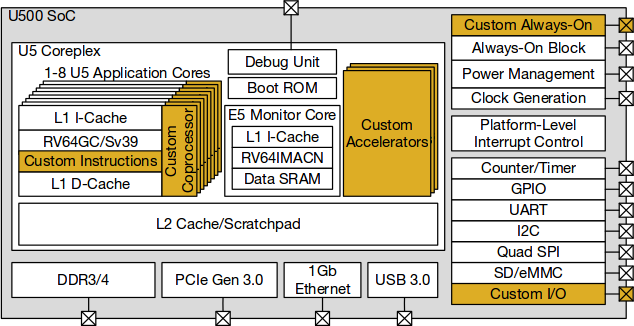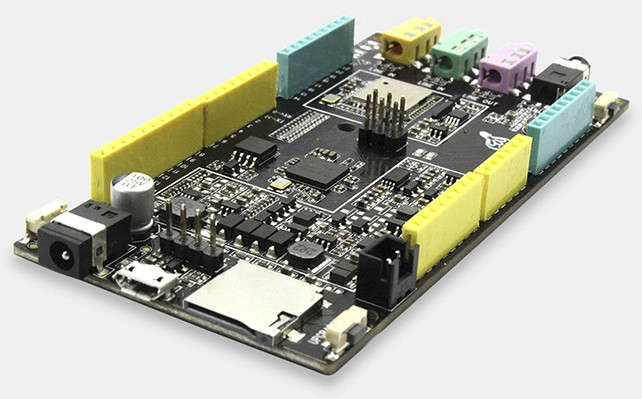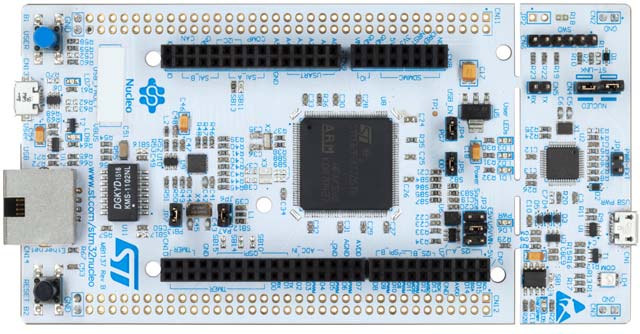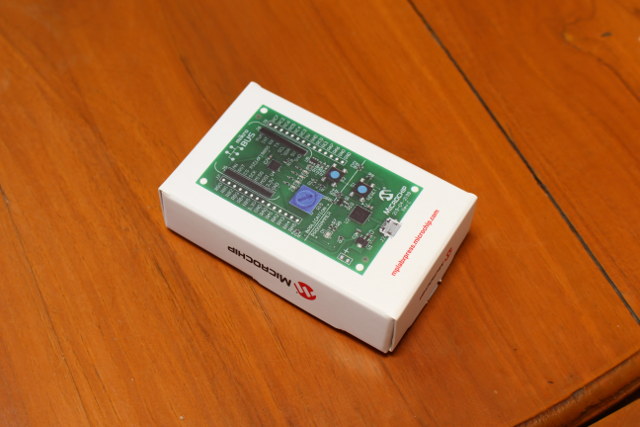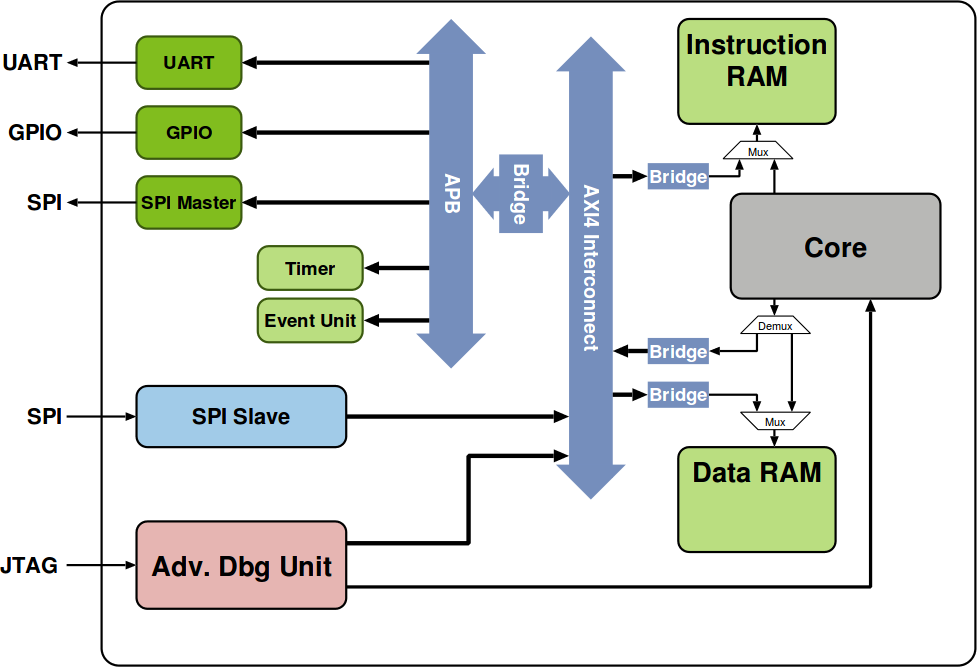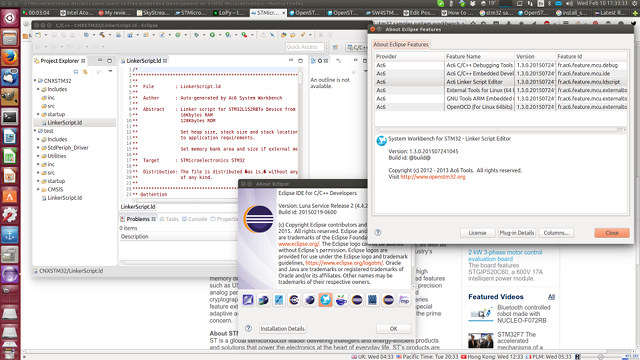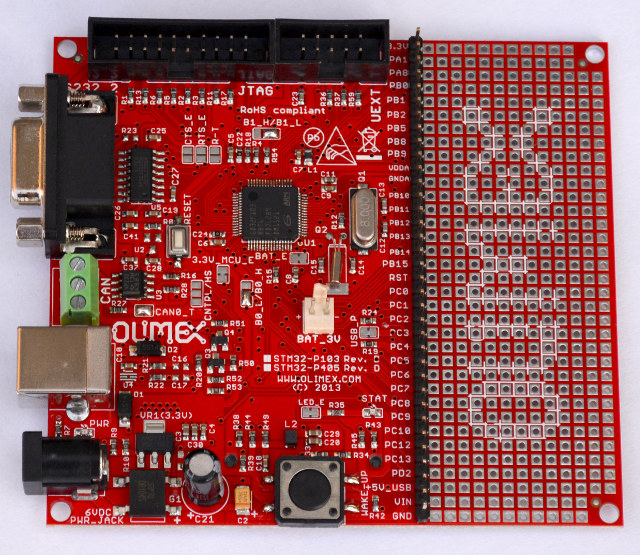Open source used to be a software thing, with the hardware design being kept secret for fear of being copied, but companies such as Texas Instruments realized that from a silicon vendor perspective it would make perfect sense to release open source hardware designs with full schematics, Gerber files and SoM, to allow smaller companies and hobbyists, as well as the education market, normally not having the options to go through standard sales channels and the FAE (Field Application Engineer) support, to experiment with the platform and potentially come up with commercial products. That’s exactly what they did with the Beagleboard community, but there’s still an element that’s closed source, albeit documented: the processor itself. But this could change soon, as SiFive, a startup founded by the creators of the free and open RISC-V architecture, has announced two open source SoCs with Freedom U500 processor and Freedom E300 micro-controller. Freedom […]
Fireduino Arduino Compatible Board Features Rockchip RKnanoD Dual Core Cortex-M3 MCU (Crowdfunding)
Rockchip RKNanoD dual core Cortex M3 micro-controller was introduced last year for IoT and audio applications, and the Firefly team, known for their FirePrime or Firefly-RK3288 development boards, has designed an Arduino compatible board based on the MCU with lots of audio ports, Arduino headers, and WiFi connectivity. Fireduino specifications: MCU – Rockchip RKnanoD dual core ARM Cortex M3 MCU @ up to 250 MHz (system core) / 500 MHz (calculate core) with respectively 640 KB and 384 KB RAM Storage – 4 or 8MB SPI flash + micro SD slot Audio 24-bit/192 KHz audio codec (built in MCU) with HW accelerator for APE, FLAC, OGG, and MP3 audio decoding 1x 3.5mm analog audio jack 2x 3.5mm LINE In jacks 1x On-board microphone DLNA wireless audio support Connectivity – 802.11 b/g/n WiFi via Ampak AP6181 module Expansion Arduino header with I2C, SPI, ADC, GPIO, PWM, UART LCD interface (Intel 8080 […]
STMicro Unveils Two Low Cost STM32F7 ARM Cortex M7 Development Boards
STMicroelectronics introduiced its STM32F7 ARM Cortex M7 micro-controller family in 2014, and they released a $49 STM32F746G discovery board later in 2015. The company has now launched two new low cost development boards with the $23 STM32 Nucleo-144 board based on STM32F767 MCU, and a $79 Discovery Kit powered by STM32F746 MCU with TFT-LCD and MIPI-DSI support. STM32 Nucleo-144 development board Key feature of NUCLEO-F767ZI board: MCU – STMicro STM32F767ZI ARM Cortex M7 microcontroller @ 216 MHz with FPU, DSP, MMU, 2MB flash, 512 KB SRAM, 16 KB instruction TCM RAM (for critical real-time routines), and 4 KB backup SRAM Connectivity – IEEE-802.3-2002 compliant Ethernet connector USB – 1x micro USB OTG or full speed device Extension: ST Zio connector including support for Arduino UNO v3 connectivity, and additional signals (A6 to A8, D16 to D72) ST morpho extension pin header footprints for full access to all STM32 I/Os On-board […]
Getting Started with MPLAB Xpress Board and Online IDE
Microchip launched MPLAB Xpress online IDE and board earlier this year, and as part of the launch they offered 2,000 free boards. I joined the program and received my board. The keyword for the board is “Xpress”, as you should be able to get started in mere minutes thanks to the operating system agnostic online IDE that works with Internet Explorer, Firefox, Chrome, and Safari. That also means you don’t need to install any other tool. All you need is a web browser. MPLAB Xpress Board Let’s start by quickly checking out the package, board, and offline documentation. Once you open the package, you’ll get the board, a folded sheet of paper for the schematics, and some information on the package itself with the pinout diagram, and a quick start guide explaining that the board acts as a mass storage device, and all you need is a web browser for […]
PULPino Open Source RISC-V MCU is Designed for IoT and Wearables
lowRISC is not the only open source processor project based on RISC-V instructions, as researchers at ETH Zurich university and the University of Bologna have developed PULPino open-source processor based on RISC-V instructions set, optimized for low power consumption, and targeting wearables and the IoT applications. PULPino is a single core processor derived from the PULP project (Parallel Ultra-Low-Power Platform) featuring a quad core RISC-V SoC with new RI5CY Signal Processing ISA extensions designed by the universities. The core has an IPC (instructions per cycle) close to 1, full support for the base integer instruction set (RV32I), compressed instructions (RV32C) and partial support for the multiplication instruction set extension (RV32M). PULPino also features peripherals such as I2S, I2C, SPI and UART. PULPino has already been taped out as an ASIC in UMC 65nm at the beginning of the year, but the RTL code be run on Xilinx Zynq-7010 powered Zedboard, […]
SiLabs Wireless Gecko SoCs Support Bluetooth 4.2, Zigbee, Thread, and 2.4GHz Proprietary Protocols
Silicon Labs has introduced three new Wireless SoC families with Blue Gecko for Bluetooth Smart, Mighty Gecko for Thread & Zigbee, and Flex Gecko for proprietary 2.4 GHz protocols. All three families provides up to 19.5 dBm output power & hardware cryptography, and are pin-to-pin and software compatible. SiLabs Wireless Gecko SoC highlights: MCU Core – ARM Cortex-M4 @ 40 MHz with FPU, up to 256 KB flash, and up to 32KB SRAM. Mighty Gecko also adds a DSP Peripherals AES256/128 Hardware Crypto Accelerator ADC (12-bit, 1 Msps, 286 µA) Current DAC (4-bit, Current Source or Sink) 2x Analog Comparator Low Energy UART 2x USART (UART, SPI, IrDA, I2S) I2C (Address recognition down to EM3) Timers : RTCC, LE Timer & Pulse Counter 12-channel Peripheral Reflex System Up to 31 GPIO EFR32BG Blue Gecko Family Bluetooth Smart (Bluetooth Low Energy or “BLE”) 4.2 specification as well as proprietary wireless protocols […]
STMicro Releases Linux based STM32 MCU Development Tools
Until a few years ago, most development tools for micro-controllers were only available for Windows, but as Linux gained popularity among developers and engineers, community of developers designed development tools running in Linux, but only a few companies are providing tools that run on Linux operating systems. The good news is that STMicro has just announced the release of STM32CubeMX configurator and System Workbench for STM32, for both Linux and Windows, with Mac OS supporting coming on Q2 2016. Developped by Ac6 embedded systems company, System Workbench for STM32 relies on Eclipse IDE, supports the ST-LINK/V2 debugging tool under Linux through an adapted version of the OpenOCD project, and can be used with various STMicro STM32 boards including Nucleo boards, Discovery kits, and other Evaluation boards. You can give it a try by visiting OpenSTM32 Community, but for some reasons they ask you to register before accessing the installation instructions. […]
GigaDevice GD32 is a Faster, Software and Pin-to-pin STM32 Compatible Cortex M3 MCU
Las month, Olimex discovered a Chinese company called GigaDevice has made an STM32 clone called GD32 and compatible with STM32F103, but with higher core frequency (108MHz). Olimex has now posted an update after receiving a letter from GigaDevice, and trying GD32F103RBT6 MCU on their own STM32F103 boards. The company explained that GD32 was their own implementation, and claimed rights on GD32 trademarks, while Olimex discovered than GD32 was working just fine on their board having passed “all functional tests without any modifications”, and with all the same development tools and software code running fine. GD32F103xx datasheet (PDF / English version) can be downloaded to find a few more details: The GD32F103xx device incorporates the ARM Cortex-M3 32-bit processor core operating at 108 MHz frequency with Flash accesses zero wait states to obtain maximum efficiency. It provides up to 3 MB on-chip Flash memory and up to 96 KB SRAM memory. […]


